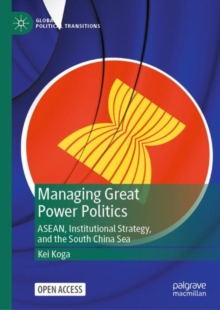Description
| Product ID: | 9789811926105 |
| Product Form: | Hardback |
| Country of Manufacture: | GB |
| Series: | Global Political Transitions |
| Title: | Managing Great Power Politics |
| Subtitle: | ASEAN, Institutional Strategy, and the South China Sea |
| Authors: | Author: Kei Koga |
| Page Count: | 284 |
| Subjects: | International relations, International relations, Diplomacy, International institutions, Diplomacy, International institutions, ASEAN |
| Description: | This Open Access book explains ASEAN’s strategic role in managing great power politics in East Asia. Constructing a theory of institutional strategy, this book argues that the regional security institutions in Southeast Asia, ASEAN and ASEAN-led institutions have devised their own institutional strategies vis-à-vis the South China Sea and navigated the great-power politics since the 1990s. ASEAN proliferated new security institutions in the 1990s and 2000s that assumed a different functionality, a different geopolitical scope, and thus a different institutional strategy. In so doing, ASEAN formed a “strategic institutional web” that nurtured a quasi-division of labor among the institutions to maintain relative stability in the South China Sea. Unlike the conventional analysis on ASEAN, this study disaggregates “ASEAN” as a collective regional actor into specific individual institutions—ASEAN Foreign Ministers’ Meeting, ASEAN Summit, ASEAN-China dialogues, ASEAN Regional Forum, East Asia Summit, and ASEAN Defense Ministers Meeting and ASEAN Defense Ministers Meeting-Plus—and explains how each of these institutions has devised and/or shifted its institutional strategy to curb great powers’ ambition in dominating the South China Sea while navigating great power competition. The book sheds light on the strategic potential and limitations of ASEAN and ASEAN-led security institutions, offers implications for the future role of ASEAN in the Indo-Pacific region, and provides an alternative understanding of the strategic utilities of regional security institutions. This Open Access book explains ASEAN''s strategic role in managing great power politics in East Asia. Constructing a theory of institutional strategy, this book argues that the regional security institutions in Southeast Asia, ASEAN and ASEAN-led institutions have devised their own institutional strategies vis-à-vis the South China Sea and navigated the great-power politics since the 1990s. ASEAN proliferated new security institutions in the 1990s and 2000s that assumed a different functionality, a different geopolitical scope, and thus a different institutional strategy. In so doing, ASEAN formed a "strategic institutional web" that nurtured a quasi-division of labor among the institutions to maintain relative stability in the South China Sea. Unlike the conventional analysis on ASEAN, this study disaggregates "ASEAN" as a collective regional actor into specific individual institutions-ASEAN Foreign Ministers'' Meeting, ASEAN Summit, ASEAN-China dialogues, ASEAN Regional Forum, East Asia Summit, and ASEAN Defense Ministers Meeting and ASEAN Defense Ministers Meeting-Plus-and explains how each of these institutions has devised and/or shifted its institutional strategy to curb great powers'' ambition in dominating the South China Sea while navigating great power competition. The book sheds light on the strategic potential and limitations of ASEAN and ASEAN-led security institutions, offers implications for the future role of ASEAN in the Indo-Pacific region, and provides an alternative understanding of the strategic utilities of regional security institutions. |
| Imprint Name: | Palgrave Macmillan |
| Publisher Name: | Springer Verlag, Singapore |
| Country of Publication: | GB |
| Publishing Date: | 2022-09-01 |


